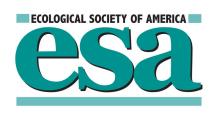Resource information
Despite playing a central role in the regulation of ecosystem services, microorganisms are often neglected when evaluating feedbacks between social and ecological systems. A socialâecological framework is a tool for evaluating how social factors affect ecosystems through human actions and how ecological factors in turn affect social systems through ecosystem services. Here, we consider linkages and tradeâoffs between social and biophysical factors that arise when unique microbial attributes such as complexity, dispersal, and rapid evolution are integrated into a socialâecological framework. Using case studies from food production systems, wastewater treatment facilities, and synthetic biology, we show that unintended disâservices can arise when microbial information is limited or is ignored as a result of socioeconomic policies and practices. In contrast, when knowledge about microorganisms is integrated into a socialâecological framework, we can identify how to best maximize microbial services. New scientific tools used to characterize microbial traits, communities, and functions will enhance our ability to monitor microorganisms in diverse systems. However, communication and collaboration among stakeholders â including policy makers, landowners, resource managers, and scientists â are also needed to foster more effective âmicromanagementâ of microbial services.



